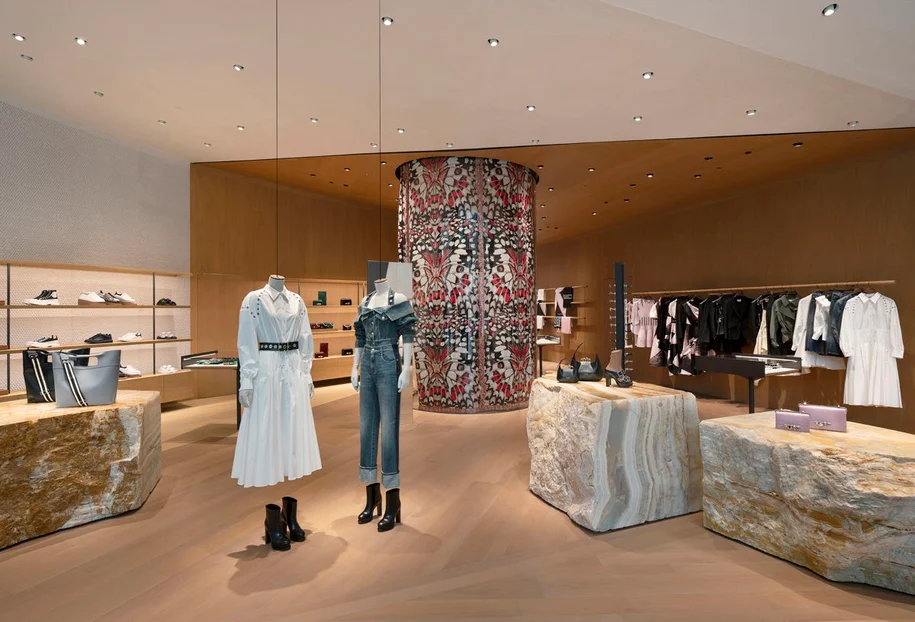A storefront window is the first thing a customer notices. It acts as your silent salesperson. Smudged or dirty glass creates a barrier. Clean windows invite people in and show you care about your brand.
In luxury retail, cleanliness and hygiene is non-negotiable. Your cleaning partner helps to shape the entire customer experience and brand perception. Retail cleaning solutions create a safe, comfortable and sophisticated atmosphere, building customer trust and influencing purchasing decisions.
A clean store enhances the visual appeal of products, encourages longer visits, and elevates the perceived value of the brand, ultimately leading to higher sales and greater customer loyalty.
Impact on Customer Experience and Perception
Store hygiene is crucial for customer experience and perception. Cleanliness tells the customer a story of your brand and what you value. Good hygiene provides customers with comfort, a sense of trust in the brand and affecting them psychologically.
Brand Image
A pristine environment signals professionalism, attention to detail, and a high regard for customer well-being, creating a positive and lasting first impression.
A study conducted by CMM found that 60% of customers believe unclean washrooms reflect poor facility management, 56% are left with a tarnished opinion of the business, and 50% said they would not return to use the facility. Demonstrating just how crucial it is for luxury brands to ensure their retails stores feel and look luxury.
Comfort and Trust
Cleanliness helps customers feel safe, relaxed and valued, fostering trust and encouraging them to spend more time and money in the store.
Retail stores can foster customer comfort and trust by implementing the following:
- Staffing: Personalised experiences with respectful and caring staff.
- Store Environment: Keeping the area clean and accessible.
- Community Engagement: Understanding customer needs and aligning the brand values to meet these.
Psychological Impact
A clean space creates a calm atmosphere, while a dirty one can cause anxiety or discomfort, directly affecting customer emotions and behaviours.
When customers encounter dirty surfaces, untidy displays, and foul-smelling interiors, they experience a lack of comfort and a no sense of reassurance. This not only affects them emotionally but also influences their willingness to remain in the store and engage with the products on offer.
Since the COVID-19 outbreak in 2019, the public now have a heightened sense of need for cleanliness in public areas. Researchers found that hygiene attributes of retail stores cause customers to fear bacteria risks and associated psychological distress, such as negative perceptions of the store and a negative future intention for revisiting the store.
Influence on Sales and Product Value
Cleanliness has a measurable impact on sales and how customers perceive product value.
Perceived Value
Cleanliness elevates the perceived value of products, making customers more willing to pay premium prices due to the brand reflecting high standards.
Within the beauty industry Cosmetics Business found that 68% of customers actively seek products that are seen as “clean”, with clean being defined as transparency from the brand and care for environmentally sustainable ingredients.
Increased Sales
Cleanliness can act as a subtle yet powerful sales driver, improving the likelihood of impulse customer purchases and higher basket values. Shoppers are more likely to make a purchase, spend more time browsing, and have a higher conversion rate in a clean, well-maintained environment.
Operational and Safety Benefits
Operational safety is key for keeping staff and visitors safe, but it also has significant operational and safety advantages that contribute to the smooth running of a luxury retail store.
Employee Well-being
A clean workspace contributes to the following attributes:
- Employee Morale
- Improve Staff Productivity
- Reduces Sickness Days
- Prevents Hazards
Employees who work in tidy, hygienic conditions are more likely to feel positive about their environment, which in turn boosts morale and productivity. Regular cleaning in a luxury retail environment reduces the spread of germs, minimises sickness-related absences, and creates a safer, more pleasant workplace.
Safety and Hazard Prevention
Consistent cleaning prevents slips, trips, and falls by addressing spillages and obstructions, while also reducing the risk of fires from accumulated waste and dust build up. By prioritising safety through cleaning protocols, retailers protect both customers and staff while maintaining the elegant atmosphere that is expected.
Luxury stores require luxury looks, glossy floors and large glass panels, although these aspects look aesthetic, they can pose great risk for customers. With internal window cleaning, your internal glass will be gleaming. Which is why it is crucial for them to include a design or signage to make customers aware they are there.
Customer Safety
Clean washrooms, well-maintained facilities, and clear pathways ensure a healthier and safer environment for customers and staff. Customers rely on facilities such as restrooms; many large department stores have washrooms available for their visitors. These facilities are essential and provide a place of privacy and safety.
Luxury retail spaces operate at a higher standard than most commercial environments, and expectations from customers are correspondingly higher. Customers expect their whole in-store journey to feel luxury, every detail, from the lighting and layout to the music and the scent, play a part in shaping this experience. Cleanliness and hygiene underpin all these elements and can make or break the desired impression.
Get in Touch
At DOC Cleaning, we understand the crucial requirements for luxury stores to keep up with visual perceptions. With over five decades of experience in high-end retail environments, we will ensure our solutions supports both customer satisfaction and commercial performance.
Contact us today to learn how our luxury retail cleaning solutions can help your store gain a return in footfall.
